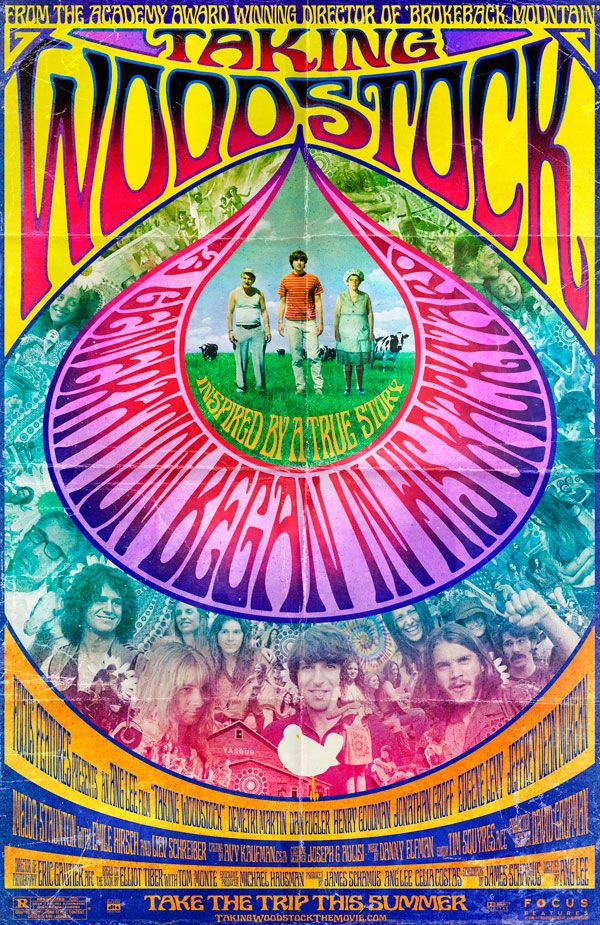Ang Lee is an interesting filmmaker. He's just one of those guys who tend to get fascinated by the right things, and even when he misses, there's usually something there. And he's definitely one of the most interesting voices of the 21st century. Crouching Tiger, Hidden Dragon, Hulk, Brokeback Mountain, Lust, Caution are easily some of the better films to emerge over the last ten years. He can be seen as mercenary (his choice of material is often as commercial as art cinema can get, though sometimes that's by smart marketing and catching a zeitgeist at the right moment), but he still has a way behind the camera. Taking Woodstock is one of his least, and my review of it comes after the jump.
The film follows Elliot Tiber (Demetri Martin) as he and his family tries and survives in upstate New York. Their hotel isn't doing excellent business, and so when Michael Lang (Johnathan Groff) comes to him with the proposition of holding his three day music festival in his neck of the woods, he uses his powers as a city government agent to make it happen, and gets Lang and his people together with Max Yasgur (Eugene Levy). This gets the Woodstock ball roling. From there the film roughly covers the three days of peace, love and rock and roll, but Elliot never makes it to the festival - he only sees it from the outset - and indulges in the free love and drug movement, opening his eyes up to the bigger world. There are also the Earthlight players - headed up by Devon (Dan Fogler) - who want to be a part of the festival.
There's something great about telling a story about the outside of one of the seminal music events of the 20th century (even if the event itself is not consistently great, and the whole thing is more a part of a mythos than an actual great thing), the film does some good in undercutting some of the assumptions about the event, and does a good job of showing that capitalism was at the root of everything. But the film plays up its collection of freaks, including cross-dresser Vilma (Liev Schrieber), freaked-out vet Billy (Emile Hirsch) and an open-to-exploration couple who take in Elliot (Paul Dano and Kelli Garner). There are also Elliot's parents Sonia and Jake (Imelda Staunton and Henry Goodman) who get dosed by some pot brownies at one point.
Yeah, that says a lot, doesn't it? The film has something in common with Transformers 2. Lee does a good job of capturing the period - all things - and the scale in one great tracking shot through the carnival of cars waiting to get closer. The film starts with some interesting ideas removed from the normal thought process of events like these, as the peace and love is undercut by the mercenary business dealings, but this is one facet of the story, as is Elliot's awakening to expanding his consciousness, and possibly leaving the closet. This is never a central concern, which is fortunate as his growing up and accepting himself is the least interesting aspect of the film, but then the film gets taken over the by flower power spirit, much as it effects one of the neighborhood cops (in one of the better moments of the film). At the end, Lee sets up how Altamont was only a couple of weeks away, but this sort of foreshadowing is something either that hits you upside the head or goes right over it. The film is at times critical of the hippies, but also falls under the sway of the period, which is why the film comes across as a bit muddled. There are good things here, but there's also some sour notes, even when performers as talented as Hirsch, Levy and Schrieber are delivering them. In the end, the film feels a bit timid, but it's not without pleasures.
Universal's Blu-ray presents the film in widescreen (1.78:1) and in 5.1 DTS-HD. The transfer is outstanding. The film comes with a commentary by Lee and producer/writer James Schamus, and the two have a great rhythm together. It's a fairly insightful and playful commentary (the start it by making bong sounds). There's six deleted scenes (11 min.), a making of called "Peace, Love and Cinema" (19 min.), and a piece on the Earthlight players called "No Audience Required" (4 min.).




.jpg)